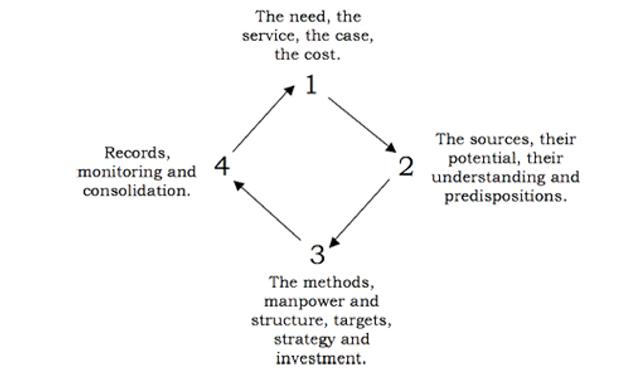The Fundraising Cycle: the shortest book on fundraising, ever
- Written by
- Redmond Mullin
- Added
- May 23, 2011
First principles

Fundraising is a function of idealism. It must be sensitive, challenging, technically skilled and efficient; but fundraising will fail if it concentrates only on money.
The reason for this is clear. Fundraising is the activity that makes caring service possible. The urgency of a fundraising message and function is proportionate to the urgency of the cause they support. Unless the values associated with a cause merit response, there is no justification for fundraising. The corollary is that, where the cause demands a response and the response entails voluntary finance, fundraising becomes a critical priority and responsibility for everybody involved.
Here a separate but equally important issue emerges. Those who directly serve need are privileged; but, in the sector that concerns us, they can succeed only with voluntary financial support. The donors who provide such support generally lack the talent, training and opportunity to give service directly. Indeed, it is essential to the service of need that they should continue to create the means through business and commercial activity that will make the funding of service possible.
The voluntary supporter of a cause should be allowed to achieve more than a mere transfer of funds. A gift can express understanding, sympathy, assent to a cause, shared values. It usually depends on the fundraiser to permit this realisation of a donor's latent idealism. For the person at desk or workbench, a gift may be the only method for sharing in service; but this will not happen if all that is experienced is a cold and lonely transfer of cash from bank to good cause.
This theory can become the foundation for effective practice.
Hold these points in mind, as you read on:
- It is the cause that gives reason for fundraising.
- It is the donor whose engaged understanding, heart and will gives substance to fundraising.
- Dedication to caring service never excuses bad and inexpert fundraising.
The fundraising cycle
 View original image
View original image
There is a basic fundraising discipline that has proved valid for any type of fundraising - spectacular disaster appeals being an exception. It has been applied successfully to local, regional, national and international campaigns, and may be described as a cycle with four cardinal points:
The cardinal points of the cycle are these:
1. Articulate the reasons why the needs you serve are urgent and why your response to the needs you serve merits generous support. Project clearly and fully the capital and revenue requirements.
You may be convinced of the merits of your cause and understand why it should receive priority. However, your prospective supporters will subject the arguments you present to stern critical scrutiny, particularly because yours will be one amongst many claims made on them. In terms that are comprehensible and motivating to them, they must be brought to understand why they should respond to you and why the response should be extraordinarily generous. They must assent to your financial targets and be shown how the support they give will make a difference.
2. Through research, identify, locate, evaluate and understand the universe of possible supporters relevant to your cause.
Such research may embrace companies, foundations and governmental agencies as well as private individuals; but in all cases it is people who decide whether to give or withhold support. Effective communication of your message will depend on your understanding of their knowledge, awareness and prejudices about you. It will depend, particularly with institutions, on the formal constraints which affect their choices. You must discover the aptest routes-of access to them: whom do you know who can bring them to you? You must also make a judgement, based on a history of their previous behaviour but more importantly on an assessment of their absolute capacity to give, concerning their financial potential in relation to your cause. One point about them will be almost universally true: however well-disposed they may be, they will be ignorant of how much they should or could give to you.
3. Determine the methods, manpower, organisational structure, strategy and investment required for the fundraising campaign.
Here some simple principles must be intelligently applied:
(a) The various techniques must be ordered strategically so that they complement and do not impede each other. Methods with a higher potential yield will normally be timed for deployment before others that are potentially less productive (particularly where the aim is to offer multiple, ordered, cumulative opportunities for giving). The timetable that governs the sequence of events for a campaign must be designed to realise the fullest potential of its target sources.
(b) There is a scale of effectiveness that can be applied in big-gift fundraising, so that targets may be set for the techniques used as well as for the sources of funds against whom these are deployed:
| Type of approach | Value 1-10 |
| 1. Individual to peer with close acquaintance or friendship, the approach being made person-to-person by somebody financially committed at the appropriate financial level. | 10 |
| 2. Individual to peer group, as above, with personal written or telephoned follow-up. | 8 |
| 3. Other approaches peer-to-peer, person-to-person as above but without prior personal acquaintance. | 6 |
| 4. As in 1, but by letter. | 5 |
| 5. Individual to peer group as in 2, without personal acquaintance but with personal follow-up. | 5 |
| 6. General, personalised mailing from somebody known to and respected by recipients but not acquainted with them. | 4 |
| 7. General, non-personalised mailing. | 3 |
| 8. Leaflet drop with personal, non-peer visit. | 2 |
| 9. Leaflet drop without personal visit. | 1 |
| 10. Response to editorial. | 1 |
| 11. Response to advertising. | 0.5 |
| 12. Any of the above badly executed. | -1 |
NB.This does not deny the value for example, of direct mail or advertising. It considers them only from the viewpoint of big gift fundraising.
(c) No fundraising programme should be undertaken unless there are the management and skilled, trained staff and volunteers to conduct it efficiently. For a programme of any significant size, the voluntary and paid workforce must operate within an organisational structure that permits optimum attainment.
(d) Evidently, the cost of a fundraising technique should be justified by the contribution it is likely to yield. However, there must also be realism concerning the interval between the moment investment is made and the time its results emerge. In a sophisticated fundraising programme, there will always be a period, sometimes extended, during which a net outflow of funds has to be endured. Premature demands for results can prevent their achievement. It is legitimate to commit funds this year to secure dependable supporters for the years ahead.
4. Install efficient systems for records, monitoring and future consolidation.
Committed donors are any not-for-profit agency's most precious assets. Unless there is a system - probably computerised - to maintain a record of your relationship with each of them, you will prevent the realisation of their generosity. The records should give a useful history of the relationship, so that you can segment your lists of donors and communicate sensitively and productively with them. You also need systems to track performance during a campaign, so that you can control progress and make timely, corrective interventions as the situation demands. Finally, you must have vehicles that will permit you to cultivate longer-term relations with donors of various kinds and at various levels of support.
Good fundraising changes realities, for you as well as your supporters.
Targets
It emerges from what has been said in the preceding section that targets for fundraising are influenced by a number of factors:
- The urgency of your capital and revenue needs, if these can be established, will obviously be crucial. However, there are some agencies whose needs are virtually limitless.
- I emphasise the concept that each fundraising source has a determinable potential.
- As do the fundraising techniques you employ, if these are implemented with skill and efficiency.
- To allow all sectors of a fundraising universe to perform optimally, the total target must be large enough to generate challenging sub-targets for every segment of the appeal. When translated at local or individual levels, there must still be a strong call to extraordinary generosity.
- Perhaps most importantly of all, the agency launching an appeal must have a firm will and determination to succeed. This will be expressed through realistic investment in fundraising and man
Fundraisers
For reasons that will become clear presently, I personally repudiate the title ‘fundraiser’. In a capital campaign my role is to equip others for fundraising. I shall retain the title temporarily, for convenience.
What are the qualities to be sought, then, in so-called fundraisers? They must have basic communications skills. Hence the stress I place on empathy with actual and potential donors. Effective communications work through the eyes and ears, head and heart of the person receiving a message, provided the sender lets this happen.
The fundraiser must be knowledgeable about a broad spectrum of established and emergent techniques, and be skilled and successful in applying at least a few of them. If the skill is not possessed personally, there must be educated experience of the external resources available (e.g. for direct mail, advertising, events, market research etc) and the ability to harness them. The fundraiser must also have entrepreneurial flair in identifying and exploiting opportunities as they arise.
Many fundraisers will have to be able managers and motivators of staff and volunteers. They will have to administer and control complex programmes calling on a multiplicity of disciplines, including marketing, public relations and advertising, in addition to all the rest. Fundraisers need diplomatic skills in extracting and sustaining support from their own boards, superiors and colleagues.
There will need to be understanding of the context in which fundraising takes place. What is its competitive environment? What are the special tax concessions that may be invoked? What is the broader fiscal frame, as it affects donors and recipients of funds? What are the opportunities for learning and developing skills, for encountering colleagues to make common cause on issues, to co-operate, to exchange experiences?
Above all, though, it is the donor who is important in fundraising. The most fully satisfied donor is the one who has given most generously. This same generous donor is likely, over time, to become increasingly generous. A body of committed donors, involved with the cause through their gifts and through sustained contact, is your most precious, enduring fundraising resource.
Significantly, it is generous donors who personally invite their equals to support the cause at levels similar to their own generosity, who are an appeal’s most effective fundraisers. This is why I prefer not to be described as 'fundraiser'. Time and again, successful experience has shown that in a structured campaign, it should be donors who do the big-gift fundraising, qualified for this role by their own generous gifts.
© Redmond Mullin May 1987.
First appearance on SOFII 2010.
Sadly, the great Redmond Mullin died in 2011. His legacy lives on in the generations of fundraisers he has influenced for good.

















